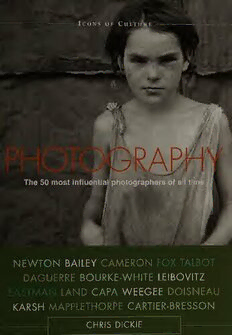
Photography: The 50 Most Influential Photographers of All Time PDF
Preview Photography: The 50 Most Influential Photographers of All Time
The 50 most influential photographers of all time NEWTON BAILEY CAMERON FOX TAl DAGUERRE BOURKE-WHITE LEIBOVITZ LAND CAPA WEEGEE DOISNEAU KARSH MAPPLETHORPE CARTIER-BRESSON CHRIS DICKIE The medium of photography is now so ubiquitous that we come across thousands of photographic images every day but seldom consider the photographers who created them. This informative and accessible volume helps fill that gap by taking you through the achievements of pioneers in the field, following 50 of the most influential photographers in history and 10 key concepts in the evolution of photography. From its mechanical beginnings to its development as an art form, and from war journalism to celebrity paparazzi. Icons of Culture: Photography explores the social and technical changes that have made the medium such a pervasive force in our lives. 1 Icons of Culture PHOTOGRAPHY The 50 most influential photographers of all time First edition for the United States, its territories and dependencies, and Canada published in 2010 by Barron's Educational Series, Inc. Copyright © Elwin Street Limited 2009 Conceived and produced by Elwin Street Limited 3 Percy Street London WlT IDE United Kingdom www.elwinstreet.com All rights reserved. No part of this publication may be reproduced or distributed in any form or by any means without the written permission of the copyright owner. All inquiries should be addressed to: Barron's Educational Series, Inc. 250 Wireless Boulevard Hauppauge, NY 11788 www.barroiiseduc.com ISBN-13: 978-0-7641-6295-4 ISBN-10: 0-7641-6295-0 Library of Congress Control No.: 2009926094 Design: Diana Sullada Picture credits: Corbis: pp. 27, 33,4l, 43, 50. 53, 55, 59, 65,71, 73, 81,89, 101, 103, 107, 117, 121, 125, 127; Getty Images: pp. 35, 63, 79, 87, 99, 119; Magnum: p. 109; Science and Society Picture Library: pp. 8, 13, 15, 17, 19, 21, 25, 57, 85, 113; Courtesy Sonnabend Gallery: p. 93; Stephen Shore / Galler)' Stock: p. 97; Fracnkel Gallery: pp. 46 (© Lee Friedlander, courtesy Fraenkel Gallery, San Francisco), 95 (© Robert Adams, courtesy Fraenkel Gallery, SF and Matthew Marks Gallery, NY), 111 (©The Estate of Garry Winogrand, courtesy Fraenkel Gallery, San Francisco); Time &: Life Pictures/Gecry Images: 29; Ernst Haas/Getty Images: 38; Yousef Karsh/Rex Features: 61; Annie Leibovitz/Rex Features: 69; Sipa Press/Rex Features: 77; The Advertising Archives/Irving Penn: 75; RIA Novosti/Alamy, 123; Untitled (#70), 1980, color photograph, 16 x 24 in., The Broad An Foundation, Santa Monica. Courtesy of the Artist (Cindy Sherman) and Metro Pictures; 127. Printed in Singapore 98765432 Icons of Culture PHOTOGRAPHY The 50 most influential photographers of all time CHRIS DICKIE BARRON’S CONTENTS Introduction 6 Early Pioneers Louisjacques Mande Daguerre 8 THE BIRTH OF PHOTOGRAPHY 10 William Henry Fox Talbot 12 Eadweard Muybridge 14 The Lumiere Brothers 16 George Eastman 18 ■ Edwin Land 20 FROM FILM TO DIGITAL 22 Photojournalism Mathew Brady 24 Weegee 26 Margaret Bourke-White 28 THE CAMERA AT WAR 30 Robert Capa 32 W. Eugene Smith 34 THE PICTURE ON A PAGE 36 Ernst Haas 38 Documentary August Sander 40 Dorothea Lange 42 Henri Cartier-Bresson 44 ^ Lee Friedlander46 THE PHOTOGRAPH AS DOCUMENT 48 William Eggleston 50 Martin Parr 52 i Sebastiao Salgado 54 Portraits Julia Margaret Cameron 56 Walker Evans 58 Yousuf Karsh 60 ' Diane Arbus 62 Robert Mapplethorpe 64 SEX AND THE CAMERA 66 Annie Leibovitz 68 Fashion Horst R Horst 70 | Cecil Beaton 72 | Irving Penn 74 j Helmut Newton 76 Richard Avedon 78 David Bailey 80 ROCK-AND-ROLL YEARS 82 Land and Topography Francis Frith 84 Edward Weston 86 Ansel Adams 88 . ARTISTS AND ALTERNATIVE PROCESSES 90 Bernd and Hilla Becher 92 Robert Adams 94 Stephen Shore 96 Cities BrassaT98 ^ Bill Brandt 100 Robert Doisneau 102 WHEN THE CAMERA LIES 104 Helen Levitt 106 Robert Frank 108 Garry Winogrand 110 Artist Photographers Alfred Stieglitz 112 PHOTOGRAPHY AS ART 114 Edward Steichen 116 Man Ray 118 | Laszio Moholy-Nagy 120 Alexander Rodchenko 122 Andre Kertesz 124 | Cindy Sherman 126 Index 128 INTRODUCTION As cultural media go, photography is a relative newcomer: just 170 years old. Yet it is ubiquitous. As long as 2,500 years ago, aspects of optical principles were understood and described, but it was well into the nineteenth century before someone managed to devise a way of capturing a permanent image created by focused light; and then, within days of each other, two of photography's pioneers made public announcements of their inventions, conceived independently on either side of the English Channel. P hotography was born. Without it there would be no films or television and, while the Internet might still exist, it would be a pretty dull place. The inventors of photography were scientists and businessmen, its early practitioners gentlemen hobbyists and tradesmen; now we are all photographers and the world is awash with images, as are the networks that now connect it. An early application of the new art/science of photography was portraiture: painters saw their livelihoods under threat. But before long it had spread into myriad genres: topography and “If a day goes by without landscape, documentary and my do i ng so met hi ng photojournalism, science and related to photography, research, art and illustration, it's as though I've advertising and fashion, social portraiture and weddings. No neglected something area in which an image played a essential to my existence, role was untouched, and with as though I had the invention of the snapshot forgotten to wake up. ” camera the medium became democratized. Richard Avedon 67
